Supporting letters from faculty colleagues and previous undergraduate mentees are encouraged. Typical nomination packets include two to five supporting letters.
A list of undergraduate mentees from the past five years and a list of their accomplishments (i.e. papers, presentations, current positions) is encouraged but not required.
Email electronic nomination materials as a single PDF to Jane Greer, director of Undergraduate Research.
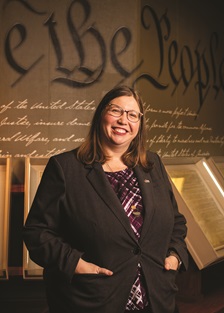 Debra Leiter
Debra LeiterDr. Debra Leiter, Associate Professor of Political Science, is an expert in comparative politics whose research examines the intersection of elections, parties, and voting; election forecasting; and how context shapes political decision-making, primarily in Western Europe. She shares her passion for research through her classes, individual mentorship, communication with colleagues, presentations to campus groups, and publications on the pedagogy of incorporating research and teaching. Not only does Dr. Leiter incorporate components of research in upper-level courses, but she also teaches a EUReka! class that allows students to develop, execute, and present a research project while completing an introductory course requirement for the political science major. Students who have conducted independent research projects under Dr. Leiter's mentorship have published in undergraduate research journals, presented at regional and national conferences, and pursued graduate studies in prestigious political science programs. Her mentees describe Dr. Leiter as vibrant, captivating, passionate, and dedicated
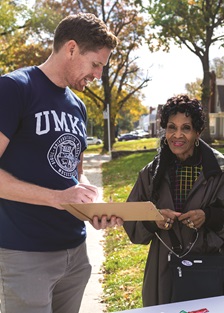 Joseph Lightner
Joseph LightnerAs Program Director and Assistant Professor of Public Health, Dr. Joseph Lightner has developed various ways to immerse students in research throughout their undergraduate studies. Dr. Lightner's research focuses on increasing physical activity for large populations, and students have been able to engage with that work through EUReka! courses, work-study opportunities, and mentored independent research projects. Dr. Lightner is particularly adept at helping students formulate research questions about the public health issues that interest them and guiding them to answer their questions through a systematic and scientific process. He and his students can be found working in local schools and partnering with municipal governments to foster healthier communities. Dr. Lightner's confidence in his students' abilities and potential have led them to pursue opportunities they might not have thought possible without his encouragement.
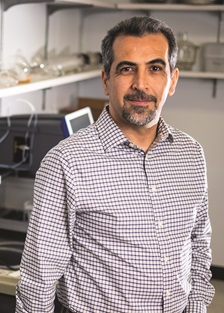 Mohammad Rafieex
Mohammad RafieexWhen Dr. Mohammad Rafiee came to UMKC as an Assistant Professor of Chemistry in 2019, he immediately began seeking undergraduate students to join his lab as researchers. Over the last five years, he has developed a vibrant team of researchers that has included 17 undergraduate students. Dr. Rafiee's research on the use of electroanalytical techniques to explore and expand the scope of electrosynthetic reactions has a unique appeal to undergraduate researchers in that they can develop new experiments to be used in educational settings. Not only have Dr. Rafiee's students developed experiments that are used in UMKC's chemistry courses, but his students have also published this work in peer-reviewed scientific journals so that the techniques can be adopted in educational settings throughout the world. Dr. Rafiee's projects are ambitious and he has high standards for his students, but he teaches the skills and offers the support students need to meet their goals in the lab, in their careers, and beyond.
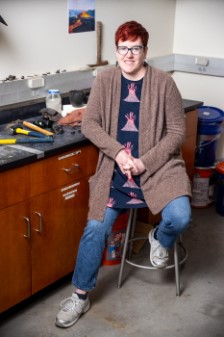 Alison Graettinger
Alison GraettingerDr. Alison Graettinger, Associate Professor of Earth & Environmental Sciences, is a volcanologist whose research focuses on maar craters and eruptions involving water and ice. Since she arrived at UMKC in 2016, she has been conducting her research not only through field work, but also through remote sensing and experiments. Dr. Graettinger's enthusiasm for her work has inspired students near and far to pursue this area of research. Through her teaching of course-based experiences in undergraduate research, Dr. Graettinger has helped students understand how the research process can be used to answer questions about their world. Through her mentoring of more than 30 undergraduate student research projects, she has helped students explore their curiosity, to expand their skillsets, and engage with a larger community of researchers. As a mentor, Dr. Graettinger has not only contributed to these students' academic and professional success, but she is helping to shape the next generation of researchers in earth and environmental science.
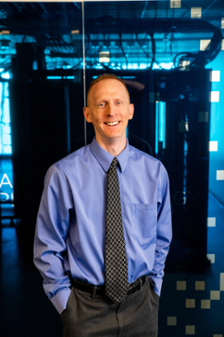 Paul Rulis
Paul RulisDr. Paul Rulis, Associate Professor of Physics, devotes his research to the development of computational methods to address problems in materials science. Since he joined UMKC's faculty in 2011, he has played an instrumental role in engaging undergraduate students in physics research. With generosity and patience, he helps students make adjustments to their approaches and methodologies so that they can resolve problems and make progress in their research. Through individual coaching and group collaboration, students acquire technical skills, develop communication skills, and gain confidence. He sets high expectations, but partners with students to make even the most ambitious goals attainable. His students have been successful not only in being awarded UMKC's SEARCH and SUROP grants, but also in being selected for competitive internships and research experiences funded by the National Science Foundation. As students work toward the next steps in their careers, they draw on the skills they've gained from Dr. Rulis.
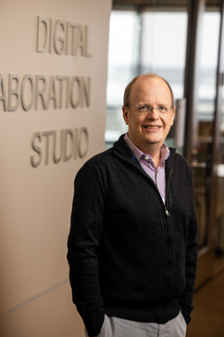 Jeffrey Rydberg-Cox
Jeffrey Rydberg-CoxDr. Jeffrey Rydberg-Cox, Curators' Distinguished Professor of Classical & Ancient Studies, researches methodologies for digitizing and analyzing ancient Greek texts, literary texts, manuscripts, and other materials in the humanities. Whether students are enrolled in a course-based experience in undergraduate research with Dr. Rydberg-Cox, or working on one of his interdisciplinary project teams, they learn to use emergent technologies to develop new strategies to analyze texts, manuscripts, and other materials in the humanities. Dr. Rydberg-Cox acts as a project manager, building rapport with the team and welcoming ideas from all of its members. Undergraduate students learn to understand the end-to-end research process and how their work contributes to the projects' goals, and they learn to articulate the value of their work to other scholars and professionals. Just as students have made significant contributions to the development of deliverables for Dr. Rydberg-Cox's National Endowment for the Humanities-funded projects, Dr. Rydberg-Cox has helped students develop into well-rounded researchers who are prepared to work in a wide variety of settings.
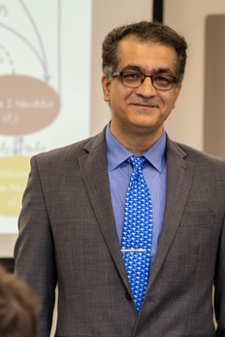 Majid Bani-Yaghoub
Majid Bani-YaghoubDr. Majid Bani-Yaghoub's interdisciplinary research employs mathematical and statistical modeling to investigate questions in ecology, health, and biomedicine. Since he joined UMKC's Department of Mathematics and Statistics in 2012, Dr. Bani has taken an innovative approach to involving undergraduate students in research through student clubs, EUReka courses, and interdisciplinary collaborations. Dr. Bani's students note that circulating their research findings has been significant to their learning, which they have done through presentations at UMKC’s symposia and at Mathematical Association of America conferences. Students have also coauthored articles that have appeared in undergraduate research journals as well as the Journal of Agricultural and Biological Sciences.
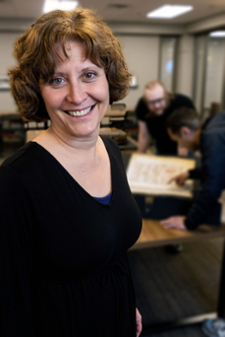 Virginia Blanton
Virginia BlantonFor 20 years, Dr. Virginia Blanton has been helping UMKC students turn their curiosity into scholarly inquiry. As a Curators' Distinguished Professor in the Department of English Language and Literature, Dr. Blanton has an active research agenda that focuses on medieval women and their relationship with books as writers, readers, patrons, and book owners. Most students first encounter Dr. Blanton's research in the classroom, and their interest morphs into collaborative research projects. Her students have conducted research in the Nelson-Atkins Museum's Spencer Art Reference Library and UMKC's LaBudde Special Collections, completing projects that led to campus and regional presentations as well as co-authored publications.
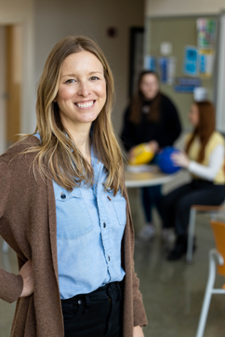 Amanda Grimes
Amanda GrimesDr. Amanda Grimes began teaching at UMKC in 2013 and became an assistant professor in UMKC's School of Nursing and Health Studies in 2018. Her community-based health research, which focuses on active transportation and the health and social influences associated with physical activity across demographic groups, offers her students the opportunity to conduct research on health behaviors and populations that interest them. By developing EUReka courses for the health studies program's curriculum, Dr. Grimes offers research opportunities to large groups of students each year, and many of those students are inspired to continue their work with student-led research projects. Undergraduate student researchers working with Dr. Grimes have procured funding through SEARCH, SUROP, and ADVANCER, and have presented their work in campus, regional, and national conferences. Students' coauthored publications have appeared in Health Education & Behavior and Pediatric Exercise Science.
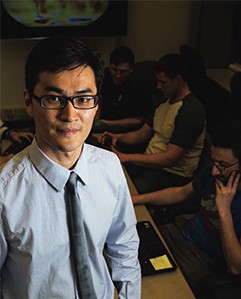
Dr. Sun has been part of UMKC’s intellectual community since 2016, and he has quickly built a reputation as an outstanding mentor for undergraduate researchers. An assistant professor in the Department of Geosciences, Dr. Sun’s research agenda is focused on high-resolution climate modeling, and he is eager to engage the next generation scientists in this critical area of study.
He has supported students’ participation in tutorial workshops at the National Center for Atmospheric Research in Boulder, Colorado, and encouraged them to apply for SEARCH and SUROP grants here at UMKC. Undergraduate researchers working with Dr. Sun have presented their work at Annual Meeting of the American Meteorological Society and at the Annual Meeting of the American Geophysical Union. His students have also had a local impact, sharing their research at NSF-funded Missouri EPSCoR meetings where they discuss climate change and its impact on the region. Undergraduate researchers working with Dr. Sun credit their success to his enthusiasm and encouragement, his passion and patience. Dr. Sun is truly a role model of mentorship for his colleagues in Geosciences as well as for faculty members across our campus.
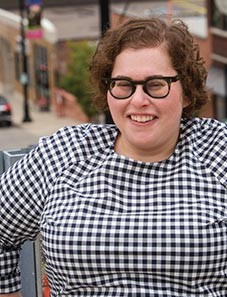
An assistant professor in the Department of Architecture, Urban Planning + Design, Dr. Frank has been at the forefront of promoting undergraduate research at UMKC. She is among the first faculty in the university to offer a EUReka course to engage first- and second-year students in our university’s research mission. Dr. Frank’s course on the history of urban planning (UPD 260) asks students to research our city’s critical urban corridors — Troost Avenue, Prospect Avenue and Linwood Blvd. Students’ research is then posted on a blog that is available not only to the university community but to residents of these areas as well. The importance of such research experiences for the newest members of our academic community is immeasurable.
As one of Dr. Frank’s EUReka students noted, “As a 32-year old, I was apprehensive about returning to school, but Dr. Frank ... was incredibly encouraging [and] helped me recognize my strengths... . My positive experience with Dr. Frank in that very first class set the stage for successful future semesters at UMKC.”
Dr. Frank has also mentored advanced undergraduates studying the built environment and walkability in Havana, Cuba, and green housing in Minneapolis. Through her skilled mentorship, Dr. Frank has helped these and other undergraduate researchers realize that the world is truly their classroom.
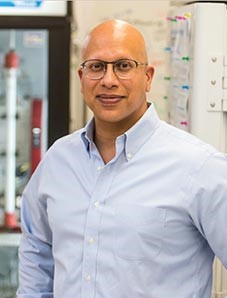
Specializing in research on the function of multiprotein complexes critical for neuroprotection, Dr. Mohan is an assistant professor in the Division of Cell Biology and Biophysics in the School of Biological Sciences. Under his tutelage, undergraduate researchers have studied the nonstop, mediated organization of neuronal cells derived from fruit flies and have explored the potential of genomic engineering for the analysis of multiprotein complexes regulating neural stability. Students mentored by Dr. Mohan have served as Undergraduate Research Ambassadors and represented UMKC at Undergraduate Research Day @ the Capitol in Jefferson City.
With a team-based approach to mentoring, Dr. Mohan supports students at all levels of academic preparation in his lab. As one student noted in her nomination letter, “At our group lab meetings, he has each student present their data so that everyone is up to date on the overall lab progress. Students and Dr. Mohan provide feedback to each other on presentation skills and laboratory data; this creates a knowledge transfer that increases improvement and efficiency in the lab. Dr. Mohan provides an authentic research experience, while also providing genuine support for each of his students.”
Dr. Mohan is a role model of mentorship for students as well as colleagues.
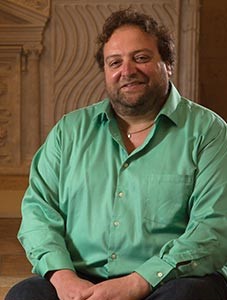
Dr. Vitiello, an associate professor who specializes in ancient history and late antiquity, currently holds a Royall Distinguished Professorship within the College of Arts and Sciences. Students mentored by Dr. Vitiello describe him as passionate, caring and a model of scholarly virtue.
The success of Dr. Vitiello’s work can be measured by his students’ impact in the wider scholarly community where they are regular presenters at regional, national, and international conferences and have matriculated to prestigious graduate programs, including Duke University’s Department of Religion and the Yale Divinity School.
As one Dr. Vitiello’s current students touchingly wrote in her nomination letter, “When I came to UMKC I had no confidence in myself and my academic ability. Dr. Vitiello believed in me when nobody else has and continues to do so. I was unsure if I would ever graduate at all and now I am debating which graduate program would best suit my career goals as a scholar, and this newfound confidence and focus are completely thanks to Dr. Vitiello.”
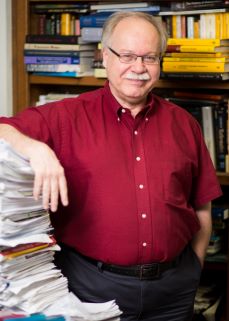
Dr. Delaware has been part of UMKC’s intellectual community for over 35 years, and he currently holds the title of Teaching Professor in the Department of Mathematics and Statistics. In the past fourteen years, he has mentored nearly 50 undergraduates in advanced mathematics classes, helping students transition from, according to colleague Dr. Eric Hall, the “procedural training of the calculus sequence to the art and skill of reading and writing the prose arguments known as ‘proofs’ in mathematics.”
Dr. Delaware’s skill in assisting students make this critical transition is best exemplified by the 11 students who have won national awards for their writing from the History of Math Special Interest Group of the Mathematical Association of America. With Dr. Delaware’s support, these students have researched figures ranging from Abu’l Wafa Al-Buzjani, who brought together art and mathematics in medieval Islamic culture, to Florence Nightingale, whose work as a statistician is largely unrecognized.
Dr. Delaware’s former students can be found among the talented math teachers who work in high schools and community colleges throughout Kansas City; among graduate students in top-tier MA and PhD programs in mathematics, physics, and economics; and among the ranks of analysts, statisticians, actuaries, and scientists working in businesses across the U.S. and around the world.
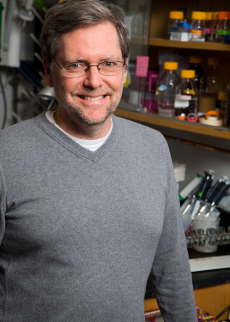
Specializing in research on the genetic and molecular basis of cell fate boundary formation, Dr. Dobens is Professor in the Division of Molecular Biology and Biochemistry in the School of Biological Sciences. A noted expert on Drosophila oogenesis, Dr. Dobens’ widely-cited research has been funded by the National Institutes of Health (NIH) and the National Science Foundation (NSF), and he has deftly leveraged those dollars to support the investigations of undergraduate researchers in his lab.
Under his tutelage, undergraduate researchers have studied the role and regulation of the tribbles gene in the Drosophila ovary and have worked to detect the insulin pathway target FOXO using a GFP Fusion Protein. On our campus, students mentored by Dr. Dobens have served as Undergraduate Research Ambassadors and have represented UMKC at Undergraduate Research Day at the Capitol in Jefferson City.
Upon completion of their studies at UMKC, students from the Dobens Lab find their way into leading medical schools, pharmacy programs, and graduate schools across the nation. Lauding Dr. Dobens’ “innate ability to connect with students,” his colleagues marvel at his “thoughtful, approachable” style—he is truly a role model of mentorship for students as well as other faculty members.
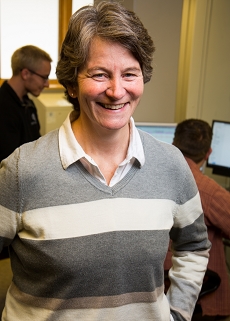
Dr. Filion was one of the driving forces in creating an undergraduate research program at UMKC in 2000, just after the Boyer Commission (1998) declared undergraduate research “the pedagogy of the 21st century.” Every UMKC student who has since earned a SEARCH grant or presented at the annual symposium during the past seventeen years is indebted to Dr. Filion and her visionary leadership regarding the transformative power of undergraduate research for students as well as faculty.
Currently a professor in the Department of Psychology, Dr. Filion has mentored countless undergraduate researchers through the years, helping them explore how sleep loss affects impulse control, emotion regulation, and decision-making as well as the processes of attentional filtering. Students fortunate to be mentored by Dr. Filion describe her as “passionate” and “inspirational,” and they revel in the collaborative, rather than competitive, environment she fosters in her lab.
The success of Dr. Filion’s work on campus can be measured by her students’ impact off campus where they are regular presenters at the Society for Psychophysiological Research. As one of Dr. Filion’s current students has eloquently noted, “Her method is not to teach science to students; rather, she creates science by creating scientists.”
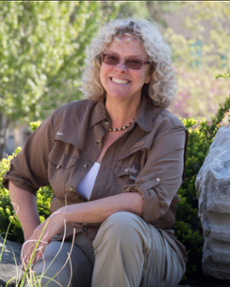
A member of the Department of Geosciences since 1995, Dr. Niemi has mentored more than 40 undergraduate researchers in just the past decade, inviting students to participate in her innovative work on neotectonics. Truly a global citizen and researcher, Dr. Niemi urges undergraduate researchers to explore the world as well as their own backyards. She has invited students to join her on research trips that span the globe, from Southeast Missouri to Jordan, from California to Turkey and from the Bahamas to India. They have worked in 108F heat to collect samples from a 13,000-year-old lake bed in Mexico; they have measured a frontal thrust fault in the Himalayans; and they have probed microfossil assemblages to track the impact of ancient tsunamis in the Caribbean.
One of Dr. Niemi’s colleagues notes that a poster in her office sets the tone for her work with undergraduate researchers: “Don’t tell me why you didn’t get it done, tell me what you have accomplished.” In that environment of promoting productivity, many of Tina’s students develop long-lasting friendships with her on their way to productive careers in industry, government service, and the academy.
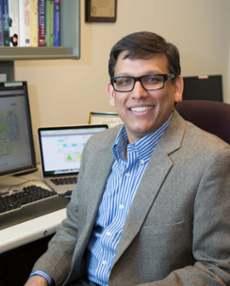
Specializing in data management and health informatics, Dr. Rao joined UMKC’s School of Computing and Engineering in 2007. A noted expert on Semantic Web data management and cloud computing, Dr. Rao’s widely cited research has earned the support of the National Science Foundation (NSF), and he has leveraged those dollars to support the investigations of undergraduate researchers in his field.
Under his tutelage, undergraduate researchers have studied query optimization techniques for federated query processing on Semantic Web data sources; SPARQL Query Optimization using Cardinality Estimates for Linked Data; and how to harness Kansas City open data to improve the lives of citizens. Thanks to Dr. Rao’s dedicated mentorship, his students have been able to share their findings at both local (e.g., UMKC Health Sciences Student Research Summit) and national conferences (e.g., 2015 Grace Hoppers Celebration for Women in Computing).
Both private sector employers, including Cerner, Skybox Imaging, and Perceptive Software, and top-notch graduate schools find the creative problem-solvers and team players that they are looking for among Dr. Rao’s mentees. As one of Dr. Rao’s colleagues notes, “There’s always a stream of students waiting to talk with him outside his office,” and he works tirelessly to foster their critical thinking skills and intellectual curiosity
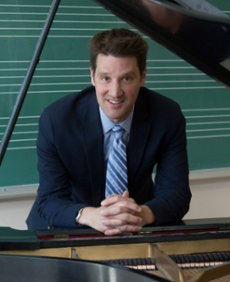
Having joined the Conservatory just three years ago, Dr. David Thurmaier is already making his mark in UMKC’s intellectual community, and he has distinguished himself as a committed, talented mentor of undergraduate students. Students describe Dr. Thurmaier as “accessible,” “enthusiastic,” “inspirational,” and “passionate,” and they speak to his dedication in helping undergraduates see themselves not just as students of music theory but as contributors to this critically important field of artistic knowledge.
Indeed, Dr. Thurmaier is committed to helping even beginning students at UMKC participate in undergraduate research and creative scholarship; he was one of the first faculty members to teach a EUReka course for 100- and 200-level students in 2015. He developed innovative assignments that allowed students in a sophomore-level course to conduct a significant inquiry into the lives and works of contemporary composers, and he invited doctoral students in the Conservatory to join in the process of mentoring these novice researchers.
Dr. Thurmaier’s students certainly benefit from his hard work and pedagogical creativity, but so do his colleagues. As one of them observed, “Among the upper-level students I’m teaching, I’ve never seen students so well prepared for research as those who were enrolled in Dr. Thurmaier’s EUReka course.”